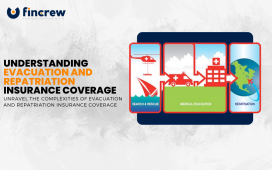The reality of a dream vacation seldom matches our fantasy: palm trees swaying in the breeze, plated meals served at whim, toes pointing toward the horizon on a sun-soaked day at sea. This vision does not consider missed flights, lost bags, or medical emergencies. The reality is, even when you try to get away from it all, life has a way of getting in the way. There are many ways to get peace of mind while on a cruise. Still, a well-tailored cruise travel insurance policy is virtually always a brilliant idea, according to industry experts. The approach ensures not only your financial investment but also can help you access quality medical care on the road and cover unforeseen expenses if anything goes wrong. This guide to travel insurance for cruises explains all you need to know to choose a policy easily. This way, you can easily plan for those future afternoons on the lido deck.
Cruise insurance: What Does It Cover?
Cruise insurance offers a variety of benefits and coverage options, much like most insurance policies. The more help you add, the more the policy costs, though you may want to check all the boxes to maximize your coverage. Almost all cruise insurance policies cover your travels before and during your cruise, as well as any medical issues you might face at sea. A cruise insurance policy, for instance, will protect you against canceled or delayed flights. Cruise insurance policies offer additional coverage, benefits, and limits in exchange for a higher premium. Your cruise policy may also allow you to cancel your cruise for any reason, as well as provide higher limits on medical expenses, lost or delayed baggage, and emergency evacuation costs.
How To Choose The Best Cruise Insurance
A good travel insurance policy is imperative whether it’s your first cruise or you’ve taken many. Travel medical expenses, trip interruption, and trip cancellation are the most common claims filed by cruise passengers. You’ll probably need these types of coverage in your cruise insurance policy:
Trip cancellation insurance: With this policy, you are refunded 100% of your prepaid and non-refundable deposits if you need to cancel for a reason.
Trip interruption policy: This covers unused trip costs at 100, 150, or 200% of the original amount if you must cut short your trip because you’re ill, injured, or die.
Emergency medical expenses: Cover any injuries or illnesses sustained during the trip. Travel insurance policies can cover medical expenses in unexpected accidents or illnesses. For example, jellyfish stings from snorkeling excursions or antibiotics in the event of a nasty disease such as strep throat.
Emergency medical evacuation cover: This helps pay for the cost of getting you to the nearest hospital or back home if necessary.
Cancel for any reason cover: Non-covered cancellations will not be covered unless you have purchased cancellation for any reason coverage. It reimburses you 50% or 75% of trip costs and allows you to cancel the trip at any time.
Where To Buy Cruise Travel Insurance
Experts recommend finding an independent, third-party insurer instead of the cruise line’s policy. A travel insurance policy from an independent insurer is typically more comprehensive than one purchased through a cruise line. Purchasing a travel insurance policy from a company like Fincrew Insurance can offer some extra benefits like emergency medical care, which may not be available under protection plans offered by cruise lines.
When To Buy Cruise Travel Insurance
You should purchase travel insurance when you have booked your cruise. If anything goes wrong before you depart, you will have the most significant window of protection. In some cases, independent insurers can cover preexisting medical conditions at no extra charge-but only if the policy is purchased within 14 to 30 days of the first payment. If you get into an accident and break your leg, for example, you can’t purchase a policy afterward, but you can buy standard travel insurance up to 24 hours before departure. The cancellation for any reason policy must be between 14 and 21 days after you make your initial trip deposit.






